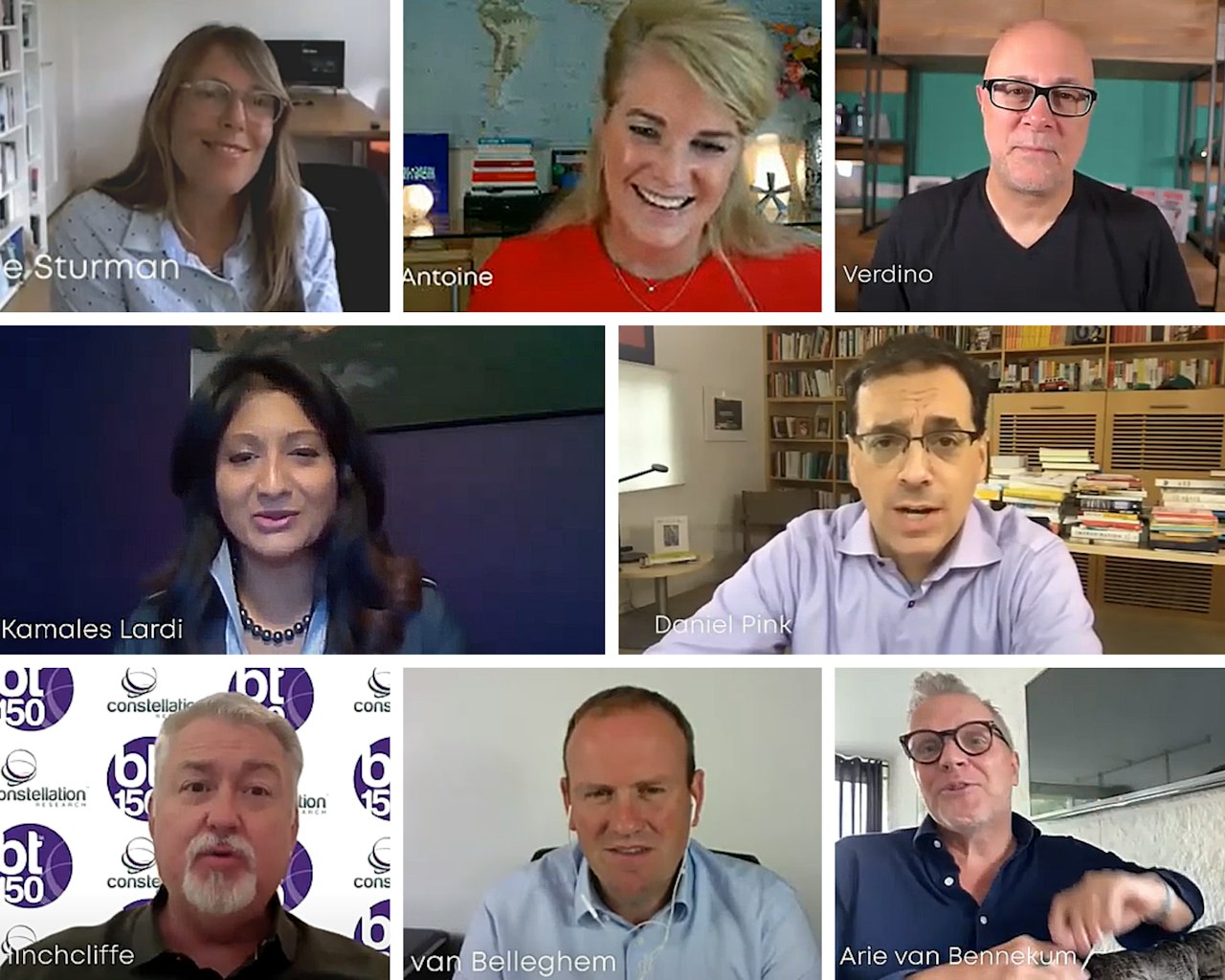Strong teamwork across national borders
Blog | workplace happiness

Work-life balance, new work, digital nomads – the list of terms that repeatedly fall within the framework of the digitalization of companies could be continued endlessly. From an employee’s point of view, this directly sounds tempting: flexible remote work regulations, whether from home or while you’re still on holiday, flexible working hours, and much more.
We approached the other side and asked our CEO what he thinks of employees suddenly working remotely around the world. Mujibor de Graaf talks about the advantages and risks of digitalization.
We offer solutions for the Digital Workplace and use them ourselves in our daily work. For example, some of our employees regularly work remotely from their homes. What requirements must be met in the company to make this possible?
We often work together digitally ourselves, even across national borders. For me, the most important thing is the feeling of togetherness. For example, someone who works from home several days a week – or even completely – should still feel as a part of the team. This sense of togetherness also promotes cooperation between colleagues, even those who are not in the office.
As far as the requirements themselves are concerned, openness and transparency are good catchwords. When our employees are in the office, you can “see” that they are working. Sometimes I have the feeling that as soon as employees work from home, they quickly feel guilty, for example when they take a short break to eat something. I would like to take that bad feeling away from them. We also take small breaks in the office and they are important to be fresh and focused while getting back to work afterwards. So as CEO I need trust in our employees to do their job effectively and well, no matter where they are.
Are there specific structures that the company needs to successfully implement a new work concept?
Corporate structures certainly play a role here. But more important to me is the structure in the team. This means that every employee knows when the others are available and in the “office” or on which days they are off. Fixed days determine structures here. However, I would also like to give our employees flexibility. As long as changes to the routine are announced well in advance, this is not a problem. The handling here is therefore similar to vacation days.
It is always important to me that direct communication between colleagues is upheld. So, all colleagues – no matter where they are – can get in touch with each other directly. Following the principle of “I’m at work and as soon as I want, I can communicate with my colleagues” – even when I am working from home. It’s important to be visible to others. This raises the question of how you can use the Social Intranet so that others can see what you’re currently working on.
Why are you on board so quickly when your staff wants to work from other places – whether it is Toronto, Budapest, Mallorca or Frankfurt?
It is particularly important to me to promote the individual dreams and goals of our employees. And that also means that I support it when someone has the positive feeling of being able to work effectively from another location. This results in a good mix between work and leisure – a healthy work-life balance. And after all, that’s good for the company itself.
In this way, we also support the personal development of our employees. The ideal in the New Work context would then be for employees to be able to decide independently at any time from where they can work best. But these freedoms also go hand in hand with the need for new organizational structures. Within our company, we are also testing ourselves to see what works best here. For us, New Work and Digital Workplace also means keeping up with new developments, constantly adapting and reinventing ourselves – in short: being lean.
Of course, I trust our employees to do their job effectively and well, no matter where they are. For me, it makes no difference whether the employees are in another country or in the office. It doesn’t matter at all. I’m not a micromanager anyway, but rather trust that I have a well-functioning team with independent employees.
What advantages does a new work concept have for the company?
I think that New Work creates positive dynamics in companies. But I would also like to come back to that feeling of togetherness: If all employees pull together and implement projects as a team, this creates a positive working atmosphere.
However, the personal wishes of the employees should not be forgotten. The employees are individuals and have different preferences as to how they can work best. New Work conveys the freedom to implement these wishes. This is also an advantage for us as a company, of course, because our employees are more satisfied. And they carry this with them to the outside world, to home, to friends, as well as in contact with customers or partners. And: satisfied employees are motivated employees; motivated employees do a better job. It is often read that billions in losses are incurred by employees who mentally have already resigned. This must be prevented. And if our employees are more satisfied through flexibility and new work, then these satisfied employees will lead to a more profitable company in the long run.
Incidentally, a company that lives New Work itself, is a more attractive employer. Today, attracting new employees requires more than just a good salary. Especially the younger generations, i.e. generation Y and Z, who enter the job market, demand a work-life balance and flexibility.
What risks do you see?
A disadvantage of flexible workplaces is essentially, and as already mentioned, the lack of personal exchange. To a certain extent, this can also be easily reproduced online. But especially when new employees join the team, it is a big advantage to meet personally instead of online.
The experience of older employees cannot be passed on as easily online. But regular meetings for example can help with this. However, there is still the danger that these appointments will be neglected if other tasks intervene. It can be difficult to arrange these meetings and above all to keep them.
I assume that we are all professionals, no matter how young the team is. But that also means that I expect professional behavior. Of course, coaching from experienced employees is a big plus, especially at the beginning. But in the end, everyone has to learn for themselves and grow with their own tasks. Even if, for example, the coaching is shorter or even canceled due to flexible work locations.
How do you handle it yourself when you’re out and about?
For me, again the connection to my team is especially important. That’s why I always have our Social Intranet opened in the background and check the home page regularly – every 5 minutes or so. This way I can see what’s happening, whether something new has been uploaded or whether my input is required. The same applies in the other direction: I have to be reachable for our employees! Other tools can also be helpful here, may it be Skype or even Whatsapp.
Taking a look at my tasks, theoretically, I could work from home 5 days a week. But being a boss, I can’t just not show up in the office at all. As CEO, I also have to be in the office and keep reminding everyone of our common goal – in Dutch, I would say: “I have to show my nose”.
Moreover, online collaboration is usually much more functional. Informal conversations and chats over a cup of coffee are quickly omitted. But these kinds of conversations are essential for the team’s cohesion. I would also like to know what is currently on the minds of our employees and what the mood is like. For example, I’m actually not in the Cologne office often enough! At the moment only once a week, I should actually be there two days a week. So that the Cologne colleagues, too, are better informed about the goals we are currently working on.
Our CTO Marc also worked from South Africa for a year. How do you remember this experience?
Of course he can do his work from anywhere. But I remember that he often had the feeling that he no longer was part of the team. So together we searched for a solution and agreed that he would try to come to Amsterdam roughly every three months. Of course, he was pleased to be able to work from abroad. But over this long period, it was negative that the connection between his colleagues in Amsterdam and him did not quite go as planned.
Especially as a manager, it is important to schedule separate appointments. Otherwise, you might not have spoken to your employees for the entire week. It is important that everyone is aware of this and if necessary reminds others!
What do you think of teamwork across national borders in general?
Between the Netherlands and Germany, it works great. But we also have independent teams at both locations. And both teams work well together.
If there are exceptions to this, e.g. working from Budapest for a week, then it is important for the team spirit to let colleagues know where you are, from where you are working and what everyday working life looks like. Perhaps it might a good idea to introduce some kind of timetable. For example, on the first day a little quiz “Where am I?”, on the second day introduce your colleagues to where you are and what is special about the surroundings, the city, and the country. A small internal diary, so to speak, which then has the same structure for each colleague.
One final question: From the CEO’s point of view, what other tips would you like to share?
That’s a good question, what comes to mind straight away?
It’s very easy not to communicate. So my first tip is: Stay connected! No matter where you work, the connections to your colleagues are the be-all and end-all and should not be lost. So why not just share a picture of lunch at home with your colleagues in the office? Or send greetings from the office to your colleagues during the lunch break? This way, you don’t get the feeling that you’re alone and can share the daily routine with your colleagues, even if they’re at a different location..
Tip number 2: You need more than just a tool to have good cooperation. A social intranet offers the perfect basis and a nice central point, but also direct communication via telephone or video calls should not be neglected under any circumstances.
My third tip is for parents. If you have children stay flexible, too! Especially with small children, it can be difficult, I have experienced that myself. For me as a boss, it is therefore important to know that the partners of our employees are also there to help. It is important for parents to think about how to arrange working hours and places flexibly. Maybe both have the possibility to work from home one day a week, or something similar.
I have one last tip. Be open to new ideas and have tolerance and trust in your employees! For example, we are currently setting up and optimizing a number of processes that make it clear to all employees what opportunities they have to shape their day-to-day work. At first, this may sound as if it takes liberties away, but it is not. Rather, these processes form a kind of framework or guideline for the digital workplace, transparent for all employees.
We love to share our knowledge with you
Related blogs



